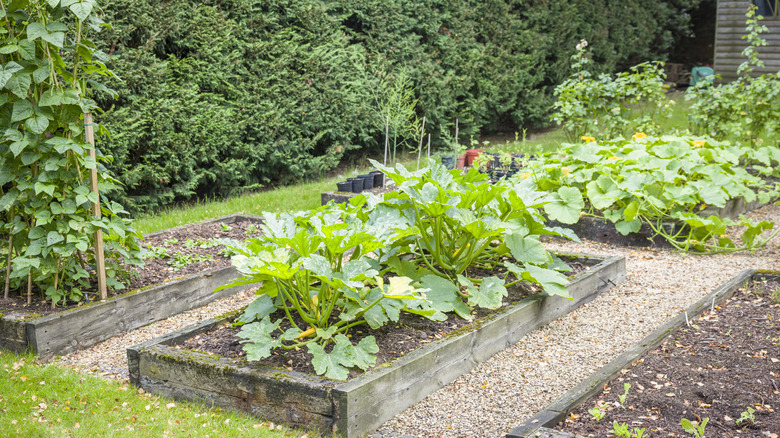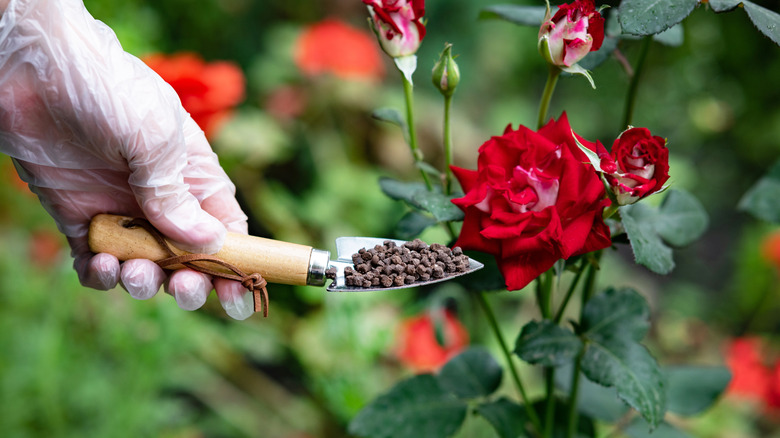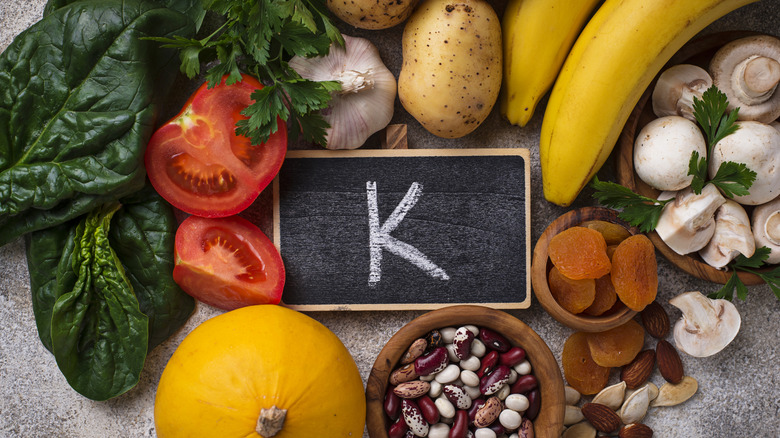Plants That Would Love A Boost Of Potassium (& What It Actually Does)
When it comes to healthy plant growth, potassium is one of the three essential nutrients (along with nitrogen and phosphorus). While all plants need this supplement, quite a few benefit from larger amounts of potassium. For example, vegetable crops such as tomatoes, carrots, broccoli, peppers, and beans, will all love an extra boost. It helps improve the flavor of these crops, and will result in better quality tomatoes and a bigger harvest. But that's not the only reason this element is important. In fact, most plants that produce flowers and fruits will benefit from extra potassium. This includes berries, like strawberries, raspberries, and blackberries. When thinking about feeding potassium to the fruits and vegetables that you're growing, consider those that are high in this nutritionally, as these are the ones that benefit the most from added potassium. This includes things like bananas, apricots, avocadoes, apples, oranges, and pumpkins. And, don't forget some of your favorite flowers also thrive with an extra dose, including roses and zinnias.
Essentially, potassium works to strengthen the vascular system within plants. This, in turn, allows nutrients to move easily within the plant. As you probably know, nutrients in the soil are taken up by the roots and transported upward through the plant's veins, much like blood flows through the veins of mammals. When the nutrients can flow freely, the plant can grow vigorously and produce its flowers and fruits with ease. A healthy vascular system is also important to allow the flow of water and carbohydrates within plants. That's why the many telltale signs your plants are desperate for potassium fertilizer include stunted growth and yellowing of the older leaves.
Plants that need a healthy dose of potassium
As you harvest your edible crops, it's important to understand that most of the potassium you added while they grew is now contained in your fruits and vegetables. You'll find that potatoes and sweet potatoes remove the largest amount of this nutrient, followed by spinach, celery, legumes, and many brassica species. This explains why most of the edible crops that you grow will benefit from extra potassium throughout the growing season. Flowering species such as roses, zinnias, chrysanthemums, gladioli, lilies, gerberas, and dahlias also do much better when you give them a feed that contains a little more of this nutrient than the standard 10-10-10. It helps the plants to recover from environmental and pest stresses much more quickly and aids in strong stem and bud development.
If your garden is grown in sandy soil, you'll find that trees that produce fruits and nuts such as palms and citrus trees, will need extra potassium for healthy growth. Many sandy soils are naturally low in potassium and, unlike nitrogen and phosphorus, it doesn't accumulate in the soil, so it needs to be replenished every year. For example, in California, potassium deficiency in all species of palm trees is quite common and can be identified as yellow or orange flecks on the older leaves. The same applies to citrus trees grown in Florida, where a deficiency will see a reduction in fruit set and quality.
Why potassium is so important for plants
One vital function of potassium is that it helps plants regulate the opening and closing of the stomata in the leaves. This allows the foliage to absorb moisture from the air as well as release any excess. The stomata are instrumental in absorbing carbon dioxide and releasing oxygen into the atmosphere, too. However, the regulation of these plant pores is necessary so they don't lose too much moisture and end up wilting. That's another reason potassium is important for optimum plant health – it helps plants to increase their drought resistance. Additionally, research by a vegetable and fruit specialist at the University of Delaware, has shown that potassium is responsible for increasing the sugar levels in fruiting crops like watermelons, cantaloupes, and tomatoes.
As potassium is responsible for ensuring a plant is healthy by strengthening its cell walls, adequate amounts mean plants are better able to resist disease and pest infestations. Finally, it's interesting to note that the potassium taken up by plants can only be released back into the soil if plant material is allowed to decompose. This is why it's so important to make sure you feed the soil with adequate amounts every season. It's also the reason why many fruits and vegetables that we consume, like bananas, beans, potatoes, and dried fruits, are high in this nutrient. As a result, many fertilizer teas you can make to nourish your garden contain excellent amounts of potassium.


